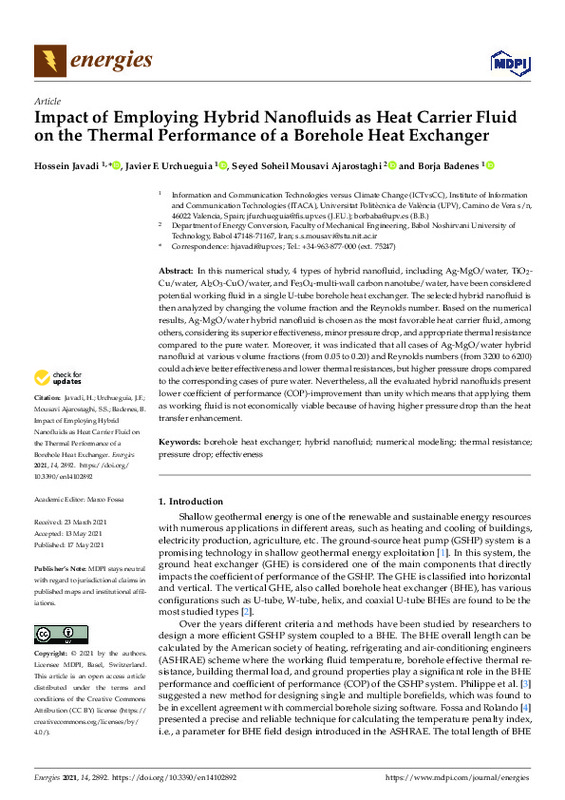JavaScript is disabled for your browser. Some features of this site may not work without it.
Buscar en RiuNet
Listar
Mi cuenta
Estadísticas
Ayuda RiuNet
Admin. UPV
Impact of Employing Hybrid Nanofluids as Heat Carrier Fluid on the Thermal Performance of a Borehole Heat Exchanger
Mostrar el registro sencillo del ítem
Ficheros en el ítem
| dc.contributor.author | Javadi, Hossein
|
es_ES |
| dc.contributor.author | Urchueguía Schölzel, Javier Fermín
|
es_ES |
| dc.contributor.author | Ajarostaghi, Seyed Soheil Mousavi
|
es_ES |
| dc.contributor.author | Badenes Badenes, Borja
|
es_ES |
| dc.date.accessioned | 2022-05-13T18:05:37Z | |
| dc.date.available | 2022-05-13T18:05:37Z | |
| dc.date.issued | 2021-05 | es_ES |
| dc.identifier.uri | http://hdl.handle.net/10251/182594 | |
| dc.description.abstract | [EN] In this numerical study, 4 types of hybrid nanofluid, including Ag-MgO/water, TiO2-Cu/water, Al2O3-CuO/water, and Fe3O4-multi-wall carbon nanotube/water, have been considered potential working fluid in a single U-tube borehole heat exchanger. The selected hybrid nanofluid is then analyzed by changing the volume fraction and the Reynolds number. Based on the numerical results, Ag-MgO/water hybrid nanofluid is chosen as the most favorable heat carrier fluid, among others, considering its superior effectiveness, minor pressure drop, and appropriate thermal resistance compared to the pure water. Moreover, it was indicated that all cases of Ag-MgO/water hybrid nanofluid at various volume fractions (from 0.05 to 0.20) and Reynolds numbers (from 3200 to 6200) could achieve better effectiveness and lower thermal resistances, but higher pressure drops compared to the corresponding cases of pure water. Nevertheless, all the evaluated hybrid nanofluids present lower coefficient of performance (COP)-improvement than unity which means that applying them as working fluid is not economically viable because of having higher pressure drop than the heat transfer enhancement. | es_ES |
| dc.description.sponsorship | This research work has been supported financially by the European project GEOCOND (funded by the European Union's Horizon 2020 research and innovation program under grant agreement No 727583) and by the European project GEO4CIVHIC (funded by the European Union's Horizon 2020 research and innovation program under grant agreement No 792355). | es_ES |
| dc.language | Inglés | es_ES |
| dc.publisher | MDPI AG | es_ES |
| dc.relation.ispartof | Energies | es_ES |
| dc.rights | Reconocimiento (by) | es_ES |
| dc.subject | Borehole heat exchanger | es_ES |
| dc.subject | Hybrid nanofluid | es_ES |
| dc.subject | Numerical modeling | es_ES |
| dc.subject | Thermal resistance | es_ES |
| dc.subject | Pressure drop | es_ES |
| dc.subject | Effectiveness | es_ES |
| dc.subject.classification | FISICA APLICADA | es_ES |
| dc.subject.classification | MECANICA DE FLUIDOS | es_ES |
| dc.title | Impact of Employing Hybrid Nanofluids as Heat Carrier Fluid on the Thermal Performance of a Borehole Heat Exchanger | es_ES |
| dc.type | Artículo | es_ES |
| dc.identifier.doi | 10.3390/en14102892 | es_ES |
| dc.relation.projectID | info:eu-repo/grantAgreement/EC/H2020/727583/EU | es_ES |
| dc.relation.projectID | info:eu-repo/grantAgreement/EC/H2020/792355/EU | es_ES |
| dc.rights.accessRights | Abierto | es_ES |
| dc.contributor.affiliation | Universitat Politècnica de València. Departamento de Física Aplicada - Departament de Física Aplicada | es_ES |
| dc.description.bibliographicCitation | Javadi, H.; Urchueguía Schölzel, JF.; Ajarostaghi, SSM.; Badenes Badenes, B. (2021). Impact of Employing Hybrid Nanofluids as Heat Carrier Fluid on the Thermal Performance of a Borehole Heat Exchanger. Energies. 14(10):1-26. https://doi.org/10.3390/en14102892 | es_ES |
| dc.description.accrualMethod | S | es_ES |
| dc.relation.publisherversion | https://doi.org/10.3390/en14102892 | es_ES |
| dc.description.upvformatpinicio | 1 | es_ES |
| dc.description.upvformatpfin | 26 | es_ES |
| dc.type.version | info:eu-repo/semantics/publishedVersion | es_ES |
| dc.description.volume | 14 | es_ES |
| dc.description.issue | 10 | es_ES |
| dc.identifier.eissn | 1996-1073 | es_ES |
| dc.relation.pasarela | S\438814 | es_ES |
| dc.contributor.funder | COMISION DE LAS COMUNIDADES EUROPEA | es_ES |








